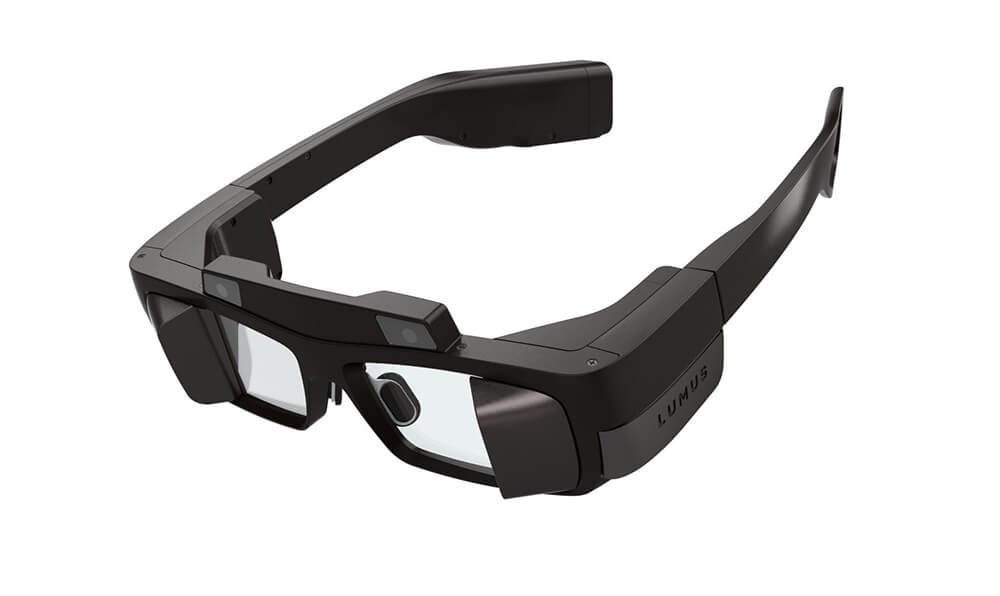Thousands of tech companies from across the world have made their way to the annual CES (International Consumer Electronics Show) conference in Las Vegas this week to showcase groundbreaking new technology and form new cooperations, including at least two dozen Israeli startups. Some of these startups have already nabbed prestigious awards.
Sixteen of the Israeli companies are part of an official delegation, spearheaded by Israeli Ministry of Economy and Industry and the Israel Export Institute, to the convention, taking place January 9-12. A number of other Israeli startups, specializing in a variety of fields including VR and AR, robotics, autonomous driving and smart homes, are also taking part in the conference, whether individually or in partnership with American ventures, including several that will be unveiling new products.
The CES convention has for the past 50 years routinely served as “the proving ground for innovators and breakthrough technologies,” and is considered “the global stage where next-generation innovations are introduced to the marketplace,” according to CES. This year, over 180,000 people are expected to attend the show which will feature more than 4,000 exhibiting companies.
SEE ALSO: Nine Israeli ‘Superhero’ Startups That Made The World A Better Place In 2017
The 16 companies that make up the Israeli delegation at this year’s CES show are:
–2sens, a Tel Aviv-based company that developed computer vision tech for capturing 3D video and 3D graphics with smartphones
–Beyond Verbal, which offers emotion analytics based on vocal intonations using artificial intelligence and claims to even detect heart disease
–Arbe Robotics, whose patented imaging radar is the first radar to provide automotive with high-resolution real-time full 4D mapping
– Byond, which developed a virtual reality publishing platform aimed at allowing “brands, media companies and businesses to create their own interactive experiences”
– Clinch, which specializes in “dynamic creative Video,” using tech and data to automate and optimize video ad campaigns
– CMOO, a company based in northern Israel that develops and sells products for smart home automation
– Fuse.it, which developed an augmented reality (AR), customizable video app for creating content and was recently in teh headlines for allowing users to dance with an animated version of US President Donald Trump.
– ICI Vision, which developed a wearable device designed to help people with visual impairment; the device works by “projecting an optimized image directly onto a person’s retina.”
– Imagery, an Israeli company in the auto tech field that is developing AI-based tech for a “cameras-only level 4/5 self-driving platform” that aims to be more cost-effective than other solutions
– Lishtot, Hebrew for “drink”, a Jerusalem-based startup that develops and builds products to detect for drinking water contamination; the company is rolling out a handheld device called TestDrop, which detects for “contaminants such as E. coli, lead, arsenic and chemicals,” and is showcasing it at the convention. Lishtot says it also developing more products such as the TeStraw, “which can distinguish between different contaminants and concentration levels,” and the TestPipe, a device that attaches to faucets for “real-time advanced water monitoring.” The company also has a “Global Water Map,” an app that tracks water quality around the world, and won first place at the CES Startup Night 2018 competition on January 8.
– MySize, which developed a patent-pending technology that provides high-accuracy measurements using smartphone readings. The company’s flagship product, MySizeID, is transforming online shopping by allowing consumers “to measure themselves, and match their measurements with a retailer’s size chart.” MySize also has TrueSize, a customizable widget that matches client’s true measurements with a given retailers’ offerings, and BoxSizeID, a parcel measurement app.
Sign up for our free weekly newsletter
Subscribe– Nanoscent, a Haifa-based company that specializes in scent recognition technology, developing a sensor-chip and AI platform
– Noveto Systems, which developed a patented technology it calls “Sowlo,” which creates “the sensation of headphones without headphones,” and allows for “an individual, personalized sound experience with added features such as 3D sound, voice command, and gesture control, without any hardware.”
– Qlone, a startup that has developed an app, based on five patented technologies, that allows users to scan real objects, using a smartphone camera, “modify them in app and seamlessly export the result” to a number of platforms “for 3D printing, 3D sharing, 3D selling or to use as a 3D asset in your game or app.” The startup has already partnered with LEGO and number of other companies for product launches.
– Superb Reality, a Tel Aviv-based company that “provides computer vision solutions for virtual reality and augmented reality experiences.”
– Syte ai, also a Tel Aviv-based startup that “combines object recognition, artificial intelligence and machine learning” to make images and videos become instantly shoppable
Other Israeli companies, some of them well-known, presenting or exhibiting at CES this year include:

OrCam device for the visually impaired via IVC-online.com
– OrCam Technologies, the Jerusalem-based company taking the power of artificial vision and incorporating the advanced technology into a wearable device that aims to revolutionize the lives of the blind and visually impaired. It was founded by entrepreneurs Prof. Amon Shashua and Ziv Aviram who brought us Mobileye, the hugely successful startup developing cutting-edge autonomous driving technologies, which was acquired by Intel last year for over $15 billion, the largest acquisition deal in Israel’s history. After launching MyEye in 2011, OrCam is rolling out MyEye 2.0 – a small, battery-operated device that attaches to eyeglasses and has a number of capabilities, including recognizing simple hand gestures, and reading out printed or digital text. The company was named a CES Innovation Awards Honoree for Accessible Tech and featured by NoCamels as one of nine “superhero startups” of 2017. Last year, OrCam closed a $41 million financing round that valued the company at $600 million, according to Shashua.
– Innoviz Technologies, also among NoCamels’ “superhero startups,” the automotive tech company that developed a 3D remote sensor based on LiDAR (Light Detection and Ranging) to generate a precise and constantly updating 3D map of a car’s surroundings. In 2017, Innoviz raised $73 million in Series B funding including from Delphi Automotive and Magna International, two of the world’s largest automotive suppliers, as its products moved into mass production. At CES, the company will demo its newest product, the InnovizOne High-Resolution 3D LiDAR. In November, the company announced that it was named an CES 2018 Innovation Awards Honoree for its InnovizPro High Definition Solid State LiDAR.
– Intuition Robotics, which made headlines in 2017 for its ElliQ social companion, an AI-powered small tabletop robot meant to improve the lives of the aging population. ElliQ can suggest content to watch, give reminders about appointments, and set up chats with friends, among other functions. The startup was named the Best of Innovation Winner in the smart home category at CES 2018 and in 2017 raised over $20 million, including $14 million from Toyota AI Ventures, the investment arm of the Japanese auto giant. The company too was named as one of NoCamels’ “superhero startups” of 2017.
– Vayyar Imaging, the Israeli startup that developed a revolutionary technology that can “see” through objects, even liquids, to deliver 3D images, with a host of applications. The tech is being used across industry sectors including automotive, construction, agriculture, smart homes, robotics and medical care. At CES, the company unveiled its latest wave of sensors for the connected home. Last month, Vayyar raised $45 million in Series C funding and was named among Business Insider’s 50 startups expected “to boom” in 2018, as well as NoCamels’ “superhero startups” of 2017.
– Argus Cyber Security, the Israeli auto tech startup acquired last year by Germany’s Continental AG for over $400 million, and which specializes in automotive cyber security, providing end-to-end security solutions that protect connected cars from hackers and malicious software. This week, it announced the integration of two of its solution suites with Renesas Electronics Corporation, which will be on display at CES.
– Cognata, an Israeli company also in the automotive industry that “provides a fast lane to autonomous driving with its testing and evaluation solution for self-driving vehicles—a realistic automotive simulation platform where virtual cars can drive millions of miles while traveling on virtual roads in virtual cities in remarkably true-to-life conditions.” Cognata is an exhibitor at CES.
– Corephotonics, the Israeli startup developing dual camera technologies for smartphones, is partnering with China’s Hisense Group and its subsidiary Hisense TransTech to unveil TransportEye, “an automotive stereo 3D camera system,” at CES, according to Hisense. Corephotonics raised more than $50 million since its founding in 2012 by Prof. David Mendlovic and Dr. Gal Shabtay.
SEE ALSO: The Coolest Israeli Technologies Wowing The Crowds at CES 2017
– Israeli-founded IoT company Essence, which will be showcasing at CES its range of end-to-end hardware and software solutions for connected living. The company’s WeR@Home tech, one of two platforms for home safety, security and management, is being integrated with the Google Assistant, Essence said in a press release, and will be on display at the convention.
– Lumus, an Israeli company that makes AR headsets, and which has partnered separately with LA-based AR platform developer Daqri, and Quanta Computer, to make smartglass lenses. The company has raised close to $60 million since its founding in 2000 and its investors: include the Alibaba Group, Jerusalem Global Ventures, and Motorola Solutions Venture Capital.

Lumus AR eyeglasses. Courtesy by Lumus
Related posts

Editors’ & Readers’ Choice: 10 Favorite NoCamels Articles

Forward Facing: What Does The Future Hold For Israeli High-Tech?

Impact Innovation: Israeli Startups That Could Shape Our Future




Facebook comments